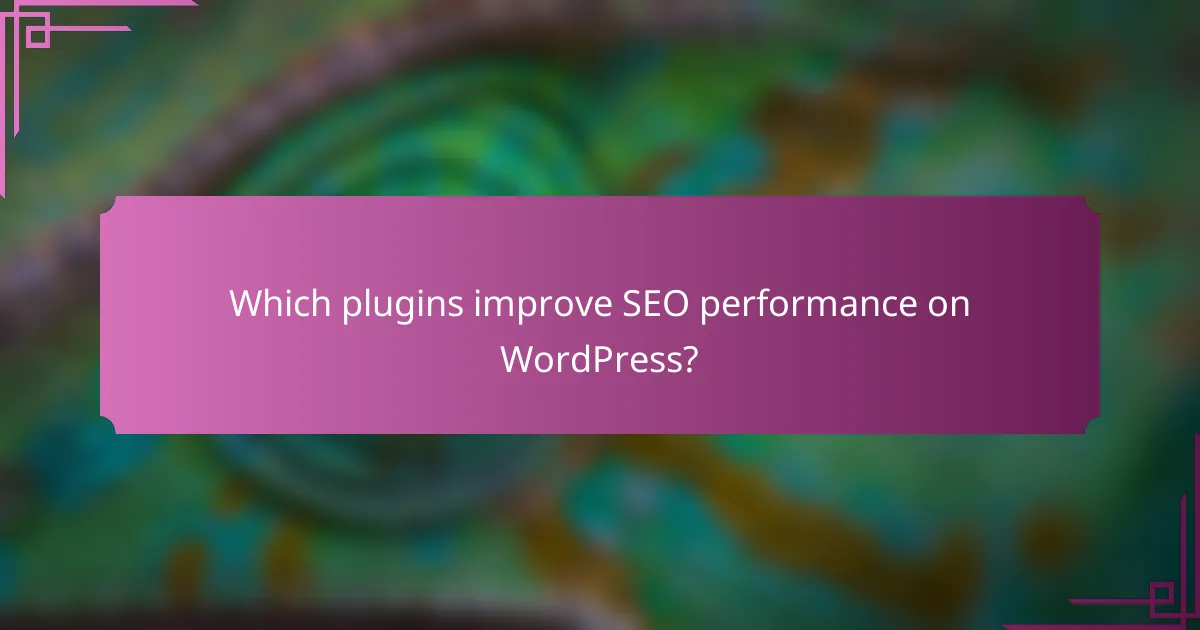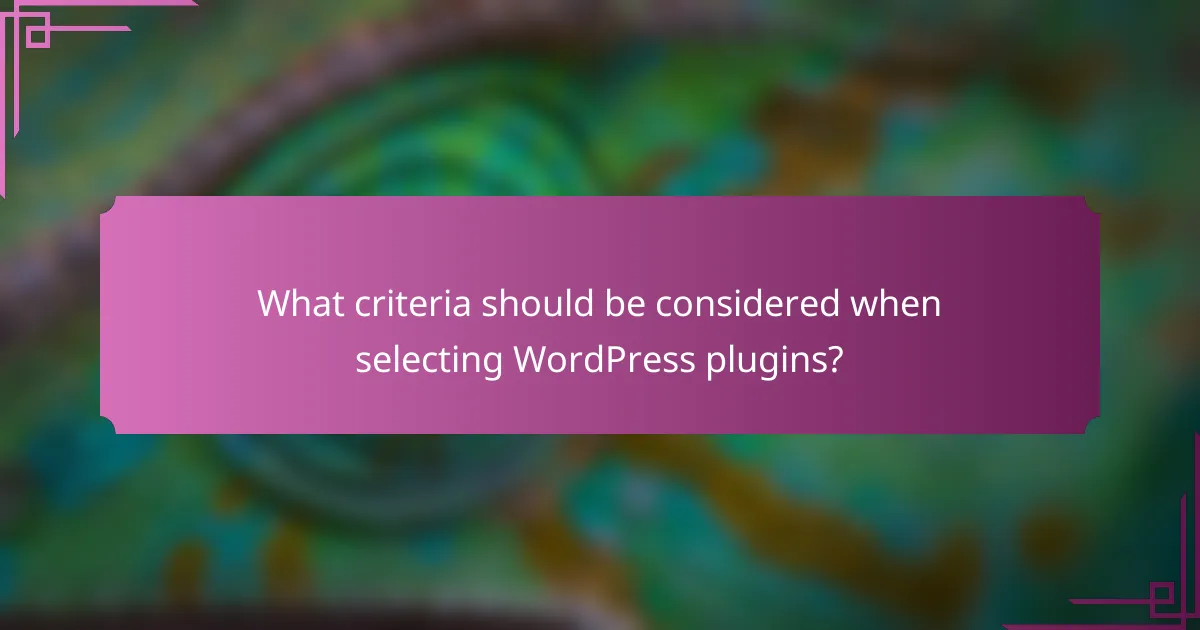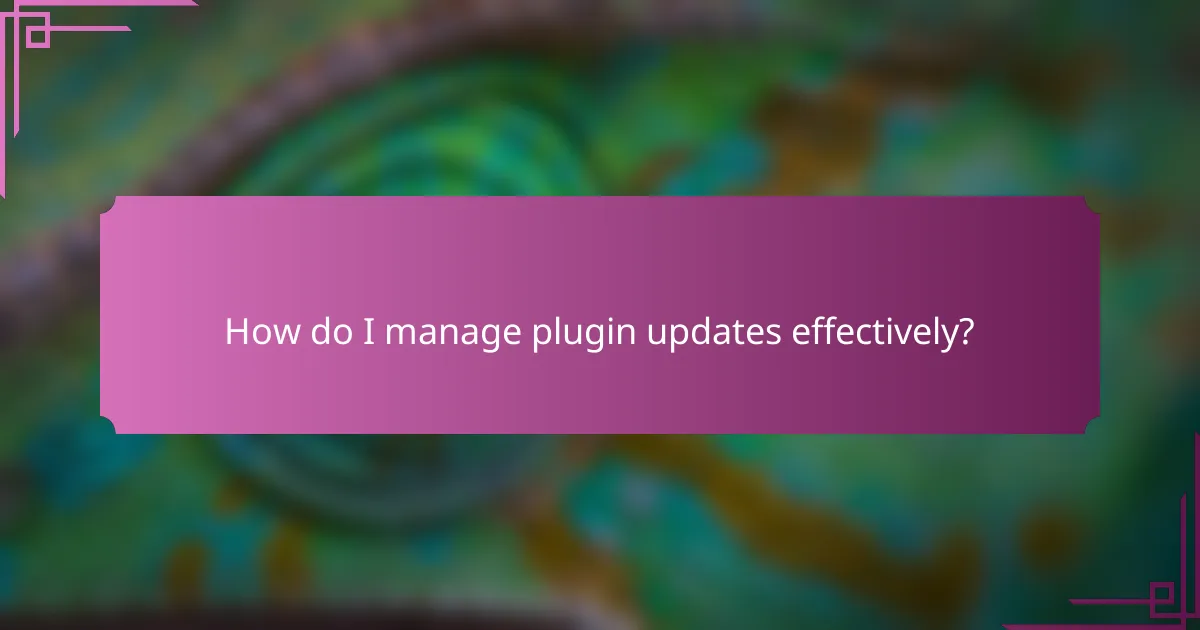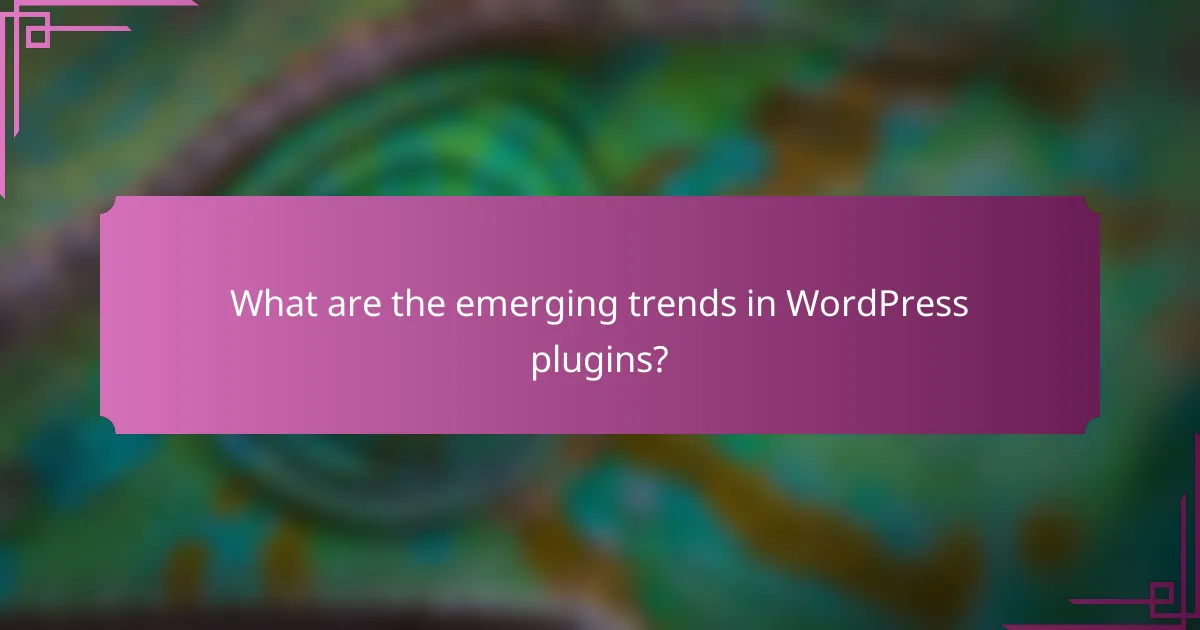WordPress plugins are essential tools that enhance your website’s functionality, security, and search engine optimization. By integrating must-have plugins, you can streamline operations, protect against threats, and improve your site’s visibility in search results. From SEO optimization to e-commerce solutions, the right plugins can transform your WordPress site into a more efficient and user-friendly platform.

What are the must-have WordPress plugins for functionality?
Must-have WordPress plugins enhance the functionality of your site, making it more efficient and user-friendly. Key plugins address essential areas like SEO, e-commerce, page building, spam protection, and security.
Yoast SEO for search optimization
Yoast SEO is a powerful plugin that helps optimize your website for search engines. It provides real-time content analysis, suggesting improvements for keywords, readability, and metadata.
To maximize its benefits, focus on using the keyword analysis feature to ensure your content is optimized for search visibility. Regularly update your sitemap and utilize the social media integration to enhance your online presence.
WooCommerce for e-commerce
WooCommerce is the leading plugin for creating online stores on WordPress. It allows you to sell physical and digital products, manage inventory, and handle payments securely.
Consider using WooCommerce if you plan to sell products directly from your site. It supports various payment gateways, including PayPal and Stripe, making it versatile for different markets. Ensure you configure shipping options and tax settings according to local regulations.
Elementor for page building
Elementor is a drag-and-drop page builder that simplifies the design process for WordPress sites. It offers a user-friendly interface and a wide range of customizable templates and widgets.
Utilize Elementor to create visually appealing pages without needing coding skills. Experiment with its responsive design features to ensure your site looks great on all devices. Keep in mind that excessive use of elements can slow down your site, so choose wisely.
Akismet for spam protection
Akismet is an essential plugin for protecting your WordPress site from spam comments and form submissions. It automatically filters out suspicious content, keeping your site clean and user-friendly.
To set up Akismet, you’ll need an API key, which can be obtained from their website. Regularly check your spam folder to ensure legitimate comments aren’t being mistakenly filtered out. This plugin is crucial for maintaining your site’s credibility and user engagement.
Wordfence for security
Wordfence is a comprehensive security plugin that protects your WordPress site from malware and hacking attempts. It includes a firewall, malware scanner, and login security features.
To enhance your site’s security, configure the firewall settings and enable two-factor authentication for user logins. Regularly monitor the security logs to identify any suspicious activity. Keeping Wordfence updated is vital for staying protected against new threats.

How do WordPress plugins enhance website security?
WordPress plugins significantly enhance website security by providing tools that protect against threats, manage vulnerabilities, and ensure data integrity. They offer features like malware scanning, firewall protection, and automated backups, which help maintain a secure online presence.
MalCare for malware protection
MalCare is a robust plugin designed specifically for malware protection in WordPress sites. It scans your website for malicious code and vulnerabilities, providing instant alerts and a one-click malware removal feature. This can be crucial for maintaining a clean and safe site.
Consider using MalCare if your website handles sensitive information or if you have experienced security issues in the past. Its real-time scanning and firewall capabilities can help prevent future attacks, making it a valuable addition to your security toolkit.
iThemes Security for hardening
iThemes Security focuses on hardening your WordPress site against various threats. It offers features like two-factor authentication, strong password enforcement, and regular security audits. These measures help to significantly reduce the risk of unauthorized access.
To maximize the effectiveness of iThemes Security, regularly update your plugin and WordPress version. Additionally, consider enabling its brute force protection to block repeated login attempts, which can be a common entry point for attackers.
UpdraftPlus for backups
UpdraftPlus is a leading plugin for creating backups of your WordPress site, ensuring that you can restore your data in case of a security breach or data loss. It allows you to schedule automatic backups and store them in various locations, such as Google Drive or Dropbox.
Regularly backing up your website with UpdraftPlus is essential, especially if you frequently update content or plugins. Aim to schedule backups at least weekly, or more often if your site changes frequently, to ensure you always have a recent version available for recovery.

Which plugins improve SEO performance on WordPress?
Several plugins can significantly enhance SEO performance on WordPress by optimizing content, improving site structure, and facilitating keyword research. Utilizing the right plugins can lead to better search engine rankings and increased organic traffic.
Rank Math for advanced SEO
Rank Math is a powerful SEO plugin that offers advanced features such as on-page optimization, rich snippets support, and automated image SEO. It provides a user-friendly interface that guides users through optimizing their content for specific keywords.
One key feature is its built-in SEO analysis tool, which evaluates your posts and pages based on various SEO factors. This allows you to make informed adjustments to improve your rankings. Additionally, Rank Math integrates seamlessly with Google Search Console, providing valuable insights into your site’s performance.
SEMrush for keyword research
SEMrush is a comprehensive tool that excels in keyword research, helping users identify high-potential keywords for their content. By analyzing competitors and search trends, SEMrush allows you to discover keywords that can drive targeted traffic to your site.
With features like keyword difficulty analysis and search volume metrics, you can prioritize keywords that are both relevant and achievable. SEMrush also offers content suggestions based on your target keywords, making it easier to create optimized content that resonates with your audience.
Schema Pro for structured data
Schema Pro enhances your WordPress site’s SEO by implementing structured data, which helps search engines understand your content better. This plugin simplifies the process of adding schema markup to your pages, improving visibility in search results through rich snippets.
By using Schema Pro, you can easily add various types of schema, such as articles, products, and reviews. This not only enhances your site’s appearance in search results but can also lead to higher click-through rates. Ensure that your structured data is correctly implemented to avoid potential penalties from search engines.

What criteria should be considered when selecting WordPress plugins?
When selecting WordPress plugins, it’s crucial to evaluate their compatibility, user feedback, and overall functionality. These criteria ensure that the plugins enhance your site without causing conflicts or performance issues.
Compatibility with themes
Compatibility with themes is essential because a plugin that works well with one theme may not function properly with another. Before installing a plugin, check its compatibility with your current theme version and any other plugins you are using. Look for plugins that are regularly updated to support the latest WordPress versions and themes.
To assess compatibility, visit the plugin’s page on the WordPress repository and review the listed compatible themes. Additionally, consider testing the plugin on a staging site to avoid disrupting your live site.
User reviews and ratings
User reviews and ratings provide valuable insights into a plugin’s reliability and performance. High ratings and positive feedback often indicate a well-functioning plugin, while low ratings may signal potential issues. Aim for plugins with a significant number of reviews, as this can provide a more accurate picture of user satisfaction.
When reading reviews, pay attention to comments regarding support responsiveness and any reported conflicts with other plugins or themes. This information can help you make informed decisions and avoid common pitfalls associated with poorly rated plugins.

How do I manage plugin updates effectively?
To manage plugin updates effectively, regularly check for updates and test them in a safe environment before applying them to your live site. This approach minimizes the risk of conflicts and ensures your website remains functional and secure.
Regularly check for updates
Regularly checking for updates is crucial for maintaining the security and functionality of your WordPress site. Most plugins will notify you of available updates in your WordPress dashboard, but it’s wise to check manually at least once a week.
When updates are available, review the changelog to understand what changes are being made. This can help you anticipate any potential issues or new features that may affect your site’s performance.
Use a staging site for testing
Using a staging site allows you to test plugin updates without affecting your live website. A staging environment is a clone of your site where you can safely apply updates and troubleshoot any issues that arise.
Before pushing updates to your live site, ensure that all functionalities work as expected on the staging site. This practice can prevent downtime and ensure a seamless experience for your visitors.

What are the emerging trends in WordPress plugins?
Emerging trends in WordPress plugins focus on enhancing user experience and site performance through advanced technologies. Key developments include AI-driven content optimization and the adoption of headless WordPress architecture for greater flexibility.
AI-driven content optimization
AI-driven content optimization plugins analyze user behavior, search trends, and content performance to enhance website content. These tools can suggest keywords, improve readability, and even generate content ideas based on data insights.
When selecting an AI plugin, consider its integration capabilities with existing tools and the depth of its analytics. Popular options include plugins that offer real-time suggestions and those that provide comprehensive reports on content effectiveness.
Headless WordPress for flexibility
Headless WordPress separates the front-end presentation layer from the back-end content management system, allowing developers to use various technologies for the user interface. This approach offers greater flexibility in design and performance optimization.
Implementing a headless setup requires familiarity with APIs and front-end frameworks. It’s essential to weigh the benefits of increased customization against the complexity of managing a decoupled architecture. Businesses looking to enhance user experience and speed may find this approach beneficial.


